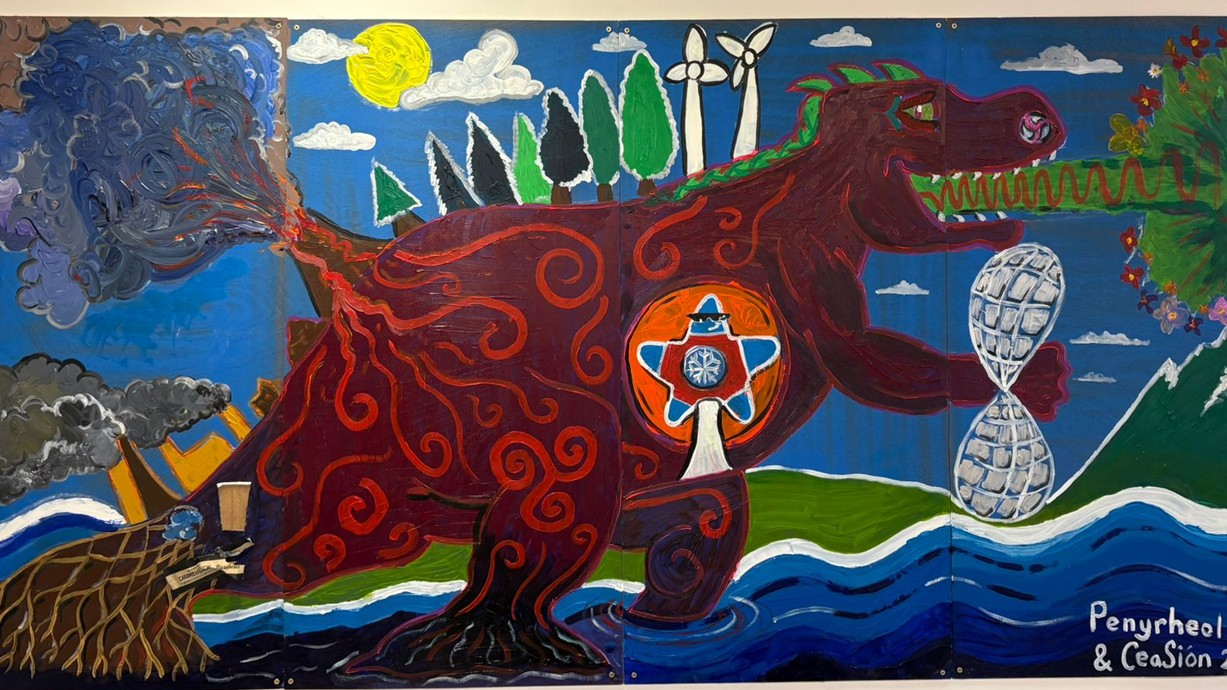
Ysgol Penyrheol STF (Specialist Teaching Facility)'s eco-warrior, which they have now incorporated into their Ancient Greek scheme of work, is a mythical creature that the gods have sent down to address climate change. Credit: Ysgol Penyrheol STF (Specialist Teaching Facility).
Children with additional learning needs (ALN) are being left behind in Wales’s climate and sustainability education—despite national promises to make environmental learning part of every child’s experience—according to a new report from Swansea University and Keep Wales Tidy.
The research shows that pupils in special schools and alternative provision settings often miss out on meaningful climate learning opportunities.
Shannon O’Connor, co-author of the report and Research Associate at Swansea University, said: “By amplifying the voices of ALN and alternative provision educators, this research paves the way for collaboration across education and policy. Inclusive climate education must be accessible to all—only then can we truly support learners to become ‘ethical, informed citizens of Wales and the world’, one of the four purposes defined in Curriculum for Wales (Welsh Government, 2022).”
Funded through a SMART Partnership between Swansea University and Keep Wales Tidy’s Eco-Schools programme, the team explored climate education across ALN settings in South Wales—from the M4 corridor to Pembrokeshire.
The research from 26 additional learning needs and alternative provision settings uncovered recurring challenges:
- A lack of tailored resources
- Limited staff training
- An absence of peer networks for sharing ideas
- Teachers feeling isolated and unsupported
These barriers reflect a wider national and global issue: without inclusive approaches, learners with ALN risk being sidelined from shaping climate solutions.
Owen Derbyshire, Chief Executive of Keep Wales Tidy, said: “If we want a fairer, greener future, we need to make sure everyone is included in the conversation, and to ensure every learner has the tools they need to affect positive change.
“Learners with additional needs are not being given the same access to knowledge, experiences, or support, and that’s not good enough.”
Despite the challenges, the report also highlights promising practices already underway. Sensory-based outdoor learning, adapted Eco-Schools initiatives, and creative projects—such as climate-themed art and ‘preloved’ fairs—are helping make sustainability education more accessible.
Gemma Sayce, a teacher from Ysgol Hendrefelin, a local authority-maintained special school in Neath Port Talbot, said: “Engaging learners with climate change education gives them a fair chance to understand today’s biggest challenges and build a lifelong commitment to protecting our planet. Embedding it across all Areas of Learning empowers them to make informed, responsible choices for a more sustainable future.”
James, a pupil from the same school, shared: “I liked learning about climate change and our planet. Now I know more ways to help stop pollution—and I want to save the seas.”
To close the current gap, the report recommends:
- Co-creating climate resources with ALN educators and learners
- Offering specialised training so staff feel confident and supported
- A specific climate change and sustainability education network for ALN and alternative provision settings
- Updating policies to include ALN and alternative provision in Wales’s climate education strategy
The researchers hope these findings will inspire a shift in how climate education is delivered—so every young person in Wales can learn about, engage with, and help shape a more sustainable future.
Read the full report: “Climate Change and Sustainability Education in Additional Learning Needs and Alternative Provision Settings”.
